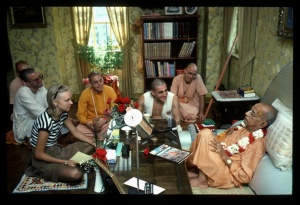SB 1.11.14 (1964): Difference between revisions
(Created page with "<div style="float:left">link=SB (1964) Eleventh Chapter - Lord Krishna's Entrance in Dwarka '''[[SB (1964) Eleventh Chapter - Lord Krishna's Entrance ...") |
(Vanibot #0020: VersionCompareLinker - added a link to the Version Compare feature) |
||
| Line 1: | Line 1: | ||
[[Category:Srimad-Bhagavatam (1962-1965) - Canto 01 Chapter 11]] | |||
<div style="float:left">[[File:Go-previous.png|link=SB (1964) Eleventh Chapter - Lord Krishna's Entrance in Dwarka]] '''[[SB (1964) Eleventh Chapter - Lord Krishna's Entrance in Dwarka]]'''</div> | <div style="float:left">[[File:Go-previous.png|link=SB (1964) Eleventh Chapter - Lord Krishna's Entrance in Dwarka]] '''[[SB (1964) Eleventh Chapter - Lord Krishna's Entrance in Dwarka]]'''</div> | ||
<div style="float:right">[[File:Go-previous.png|link=SB 1.11.13 (1964)]] '''[[SB 1.11.13 (1964)]] - [[SB 1.11.15 (1964)]]''' [[File:Go-next.png|link=SB 1.11.15 (1964)]]</div> | <div style="float:right">[[File:Go-previous.png|link=SB 1.11.13 (1964)]] '''[[SB 1.11.13 (1964)]] - [[SB 1.11.15 (1964)]]''' [[File:Go-next.png|link=SB 1.11.15 (1964)]]</div> | ||
{{CompareVersions|SB|1.11.14|SB 1964|SB 1972-77}} | |||
{{RandomImage}} | {{RandomImage}} | ||
| Line 6: | Line 8: | ||
==== TEXT No. 14 ==== | ==== TEXT No. 14 ==== | ||
<div | <div class="SB65verse"> | ||
Sammarjita mahamarga rathya apanakah chatwaram | |||
Siktam gandhajalai phala puspa akshata ankuraih. | |||
</div> | </div> | ||
| Line 14: | Line 16: | ||
==== ENGLISH SYNONYMS ==== | ==== ENGLISH SYNONYMS ==== | ||
<div | <div class="synonyms"> | ||
Sammarjita—thoroughly cleansed, Mahamarga—highways, Rathya—lanes and subways, Apanakah—shopping market place, Chatwaram—public meeting places, Siktam—moistened with, Gandhajalai—scented water, Phala—fruits, Puspa—flowers, Akshata—unbroken, Ankuraih—seeds. | Sammarjita—thoroughly cleansed, Mahamarga—highways, Rathya—lanes and subways, Apanakah—shopping market place, Chatwaram—public meeting places, Siktam—moistened with, Gandhajalai—scented water, Phala—fruits, Puspa—flowers, Akshata—unbroken, Ankuraih—seeds. | ||
</div> | </div> | ||
| Line 21: | Line 23: | ||
==== TRANSLATION ==== | ==== TRANSLATION ==== | ||
<div | <div class="translation"> | ||
The high ways, the subways, the lanes, the market place and public meeting places all were thoroughly cleansed and then moistened with scented water. And for welcoming the Lord everywhere fruits, flowers and unbroken seeds were strewn over. | The high ways, the subways, the lanes, the market place and public meeting places all were thoroughly cleansed and then moistened with scented water. And for welcoming the Lord everywhere fruits, flowers and unbroken seeds were strewn over. | ||
</div> | </div> | ||
| Line 28: | Line 30: | ||
==== PURPORT ==== | ==== PURPORT ==== | ||
<div | <div class="purport"> | ||
Scented waters prepared by distilling flowers like rose and keora were requisitioned to wet the roads, streets and lanes of Dwarka Dhama. Such places along with the market place and public meeting places were thoroughly cleansed. From the above description it appears that the city of Dwarka Dhama was considerably big containing so many high ways, streets, market and public meeting places with parks, gardens and reservoirs of water all very nicely decorated with flowers and fruits. And to welcome the Lord such flowers and fruits with unbroken seeds of grain were also strewn over the public places. Unbroken seeds of grain or the fruits in seedling stage were considered auspicious and they are still so used by the Hindus in general in festival days. | Scented waters prepared by distilling flowers like rose and keora were requisitioned to wet the roads, streets and lanes of Dwarka Dhama. Such places along with the market place and public meeting places were thoroughly cleansed. From the above description it appears that the city of Dwarka Dhama was considerably big containing so many high ways, streets, market and public meeting places with parks, gardens and reservoirs of water all very nicely decorated with flowers and fruits. And to welcome the Lord such flowers and fruits with unbroken seeds of grain were also strewn over the public places. Unbroken seeds of grain or the fruits in seedling stage were considered auspicious and they are still so used by the Hindus in general in festival days. | ||
</div> | </div> | ||
| Line 36: | Line 38: | ||
<div style="float:right">[[File:Go-previous.png|link=SB 1.11.13 (1964)]] '''[[SB 1.11.13 (1964)]] - [[SB 1.11.15 (1964)]]''' [[File:Go-next.png|link=SB 1.11.15 (1964)]]</div> | <div style="float:right">[[File:Go-previous.png|link=SB 1.11.13 (1964)]] '''[[SB 1.11.13 (1964)]] - [[SB 1.11.15 (1964)]]''' [[File:Go-next.png|link=SB 1.11.15 (1964)]]</div> | ||
__NOTOC__ | __NOTOC__ | ||
__NOEDITSECTION__ | |||
Latest revision as of 08:37, 25 May 2020

A.C. Bhaktivedanta Swami Prabhupada
TEXT No. 14
Sammarjita mahamarga rathya apanakah chatwaram Siktam gandhajalai phala puspa akshata ankuraih.
ENGLISH SYNONYMS
Sammarjita—thoroughly cleansed, Mahamarga—highways, Rathya—lanes and subways, Apanakah—shopping market place, Chatwaram—public meeting places, Siktam—moistened with, Gandhajalai—scented water, Phala—fruits, Puspa—flowers, Akshata—unbroken, Ankuraih—seeds.
TRANSLATION
The high ways, the subways, the lanes, the market place and public meeting places all were thoroughly cleansed and then moistened with scented water. And for welcoming the Lord everywhere fruits, flowers and unbroken seeds were strewn over.
PURPORT
Scented waters prepared by distilling flowers like rose and keora were requisitioned to wet the roads, streets and lanes of Dwarka Dhama. Such places along with the market place and public meeting places were thoroughly cleansed. From the above description it appears that the city of Dwarka Dhama was considerably big containing so many high ways, streets, market and public meeting places with parks, gardens and reservoirs of water all very nicely decorated with flowers and fruits. And to welcome the Lord such flowers and fruits with unbroken seeds of grain were also strewn over the public places. Unbroken seeds of grain or the fruits in seedling stage were considered auspicious and they are still so used by the Hindus in general in festival days.